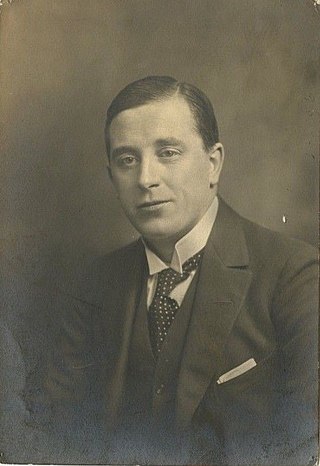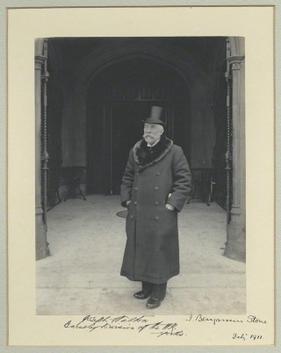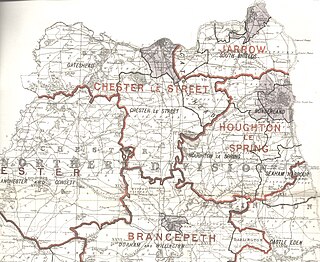| ||||||||||||||||
| ||||||||||||||||
| ||||||||||||||||
The 1919 Pontefract by-election was a parliamentary by-election held for the British House of Commons constituency of Pontefract in Yorkshire on 6 September 1919.
| ||||||||||||||||
| ||||||||||||||||
| ||||||||||||||||
The 1919 Pontefract by-election was a parliamentary by-election held for the British House of Commons constituency of Pontefract in Yorkshire on 6 September 1919.
The by-election was caused by the death on 30 July 1919 of the sitting Coalition Liberal Member of Parliament, Sir Joseph Compton-Rickett. He was 72 years old. He had been an MP in the area since 1906 when he was elected for Osgoldcross. He had been Lloyd George's Paymaster General since 1916.
The Pontefract constituency had been Liberal since 1893 and Osgoldcross Liberal since 1885. At the general election in 1918, Compton-Rickett was re-elected with the support of the Coalition Government 'coupon'.
| Party | Candidate | Votes | % | ±% | |
|---|---|---|---|---|---|
| C | Liberal | Joseph Compton-Rickett | 8,561 | 62.9 | +12.1 |
| Labour | Isaac Burns | 5,047 | 37.1 | New | |
| Majority | 3514 | 25.8 | +24.2 | ||
| Turnout | 13,608 | 45.6 | -44.7 | ||
| Liberal hold | Swing | ||||
| Cindicates candidate endorsed by the coalition government. | |||||
The by-election was a straight fight between Isaac Burns for the Labour Party, the nominee of the Yorkshire Miners' Association [2] and 50-year-old Walter Forrest, a woollen manufacturer from Pudsey for the Coalition Government of Prime Minister David Lloyd George, although the Liberals apparently had some trouble in finding a candidate at first. [3] The local Conservatives endorsed the candidacy of their Coalition partners [4] and the Independent Asquithian Liberals did not bring a forward a candidate.
The health of the coal mining industry was an issue which Isaac Burns particularly sought to make his own against the background of a coal strike taking place in the area. [5] He was hampered by the fact that although coal mining was a major industry in the area, the principal colliery towns had been attached to other constituencies in boundary changes [6] and mining was not necessarily decisive as there were many other interests in the constituency. Agriculture dominated around Barkston Ash and there was shipping and coastal trades around Goole. [2] Many in these industries were adversely affected by the coal strike and were unsympathetic to Burns and Labour as a result. [7] Burns stated he was in favour of a number of Labour policies including equal adult franchise for both sexes, pensions for mothers and free secondary education for all. He was in favour of widespread nationalisation of industry and a programme of public works to keep down unemployment. He also wanted Home Rule for Ireland and local government for India. [8]
Walter Forrest set out his position on a number of questions at his meetings of both the local Coalition Liberals and Unionist parties. He was opposed to the nationalisation of the coal mines and conscription, in favour of some relaxation of the liquor laws for the benefit of working men and improved welfare for men disabled in the war; he was also in favour of the full restoration of trade and commerce as soon as conditions allowed, to increase output and living standards. [9] He also strongly advocated economy and retrenchment [8] but one of the Liberal MPs who visited the constituency to speak for him, Dr T J Macnamara the Secretary to the Admiralty, in a speech designed to protect the position of his Department and no doubt appeal to the patriotic feelings of working class and Unionist voters, was keen to point out that national security must take precedence over economy. [7]
Forrest retained the seat for the government but with a reduced majority.

| Party | Candidate | Votes | % | ±% | |
|---|---|---|---|---|---|
| C | Liberal | Walter Forrest | 9,920 | 54.0 | -8.9 |
| Labour | Isaac Burns | 8,445 | 46.0 | +8.9 | |
| Majority | 1,475 | 8.0 | -17.8 | ||
| Turnout | 18,365 | 61.5 | +15.9 | ||
| Liberal hold | Swing | -8.9 | |||
| Cindicates candidate endorsed by the coalition government. | |||||
Osgoldcross was a parliamentary constituency in the Osgoldcross Rural District of West Yorkshire. It returned one Member of Parliament (MP) to the House of Commons of the Parliament of the United Kingdom, elected by the first past the post system.
Sir Joseph Compton-Rickett, DL PC, was a British Liberal Party politician. He was also an industrialist, lay preacher, and writer. He wrote poetry and fiction, as well as on such topics as popular philosophy. He sometimes wrote under the pseudonym Maurice Baxter.

Sir William Beddoe Rees, usually known simply as Beddoe Rees, was a Welsh architect, industrialist and Liberal politician.

The 1922 Bodmin by-election was a parliamentary by-election for the British House of Commons. The constituency of Bodmin in Cornwall polled on 23 February 1922. The by-election was notable for the opposition Liberal Party gaining a seat from the Coalition-supporting Conservative Party.

Sir William Sutherland, KCB, PC was a Scottish civil servant, Liberal Party politician and colliery owner. He was closely associated with Prime Minister David Lloyd George serving as his private and press secretary and later as his Parliamentary Private Secretary. He was one of Lloyd George's go-betweens in the sale of honours for the Lloyd George Fund. In his dealings with the press he would certainly have been labelled a spin doctor if that phrase had had currency in the early twentieth century, indeed he has recently been described as "the first of the modern spin doctors".

John McDonald Henderson was a Scottish chartered accountant, barrister and Liberal Member of Parliament.
The 1921 Penrith and Cockermouth by-election was a parliamentary by-election held for the British House of Commons constituency of Penrith and Cockermouth in Cumberland on 13 May 1921.

Sir Ronald Wilberforce Allen was an English lawyer and Liberal politician.
The 1921 Orkney and Shetland by-election was a parliamentary by-election held for the British House of Commons constituency of Orkney and Shetland on 17 May 1921.
The 1921 Bedford by-election was a parliamentary by-election held for the House of Commons constituency of Bedford on 23 April 1921.

Harold James Glanville was an English businessman and Liberal Party politician.
The 1902 Bury by-election was a by-election held in England on 10 May 1902 for the House of Commons constituency of Bury in Lancashire.

Sir Joseph Walton, 1st Baronet, DL, JP was an English coalowner and Liberal Party politician.

Gerald Ashburner France was a British businessman and importer and Liberal Party politician.
The 1927 Bosworth by-election was a parliamentary by-election for the House of Commons constituency of Bosworth in Leicestershire on Tuesday, 31 May 1927.

The 1923 Willesden East by-election was a parliamentary by-election for the British House of Commons constituency of Willesden East held on 3 March 1923. The constituency was a large one extending from Kilburn in the south to the Welsh Harp and on to Neasden.

Sir Andrew William Barton was a British Liberal politician and businessman.
The 1914 North East Derbyshire by-election was a Parliamentary by-election held on 20 May 1914. The constituency returned one Member of Parliament (MP) to the House of Commons of the United Kingdom, elected by the first past the post voting system. About a third of the electorate were directly involved in the mining industry. This was the penultimate by-election to take place before the outbreak of the First World War. It demonstrated the weakness of support for the Labour party in 1914 when opposed by a Liberal party candidate.

The 1914 North West Durham by-election was a Parliamentary by-election held on 30 January 1914. It returned one Member of Parliament (MP) to the House of Commons of the United Kingdom, elected by the first past the post voting system.
The 1917 Aberdeen South by-election was a parliamentary by-election for the House of Commons constituency of Aberdeen South comprising the local government wards in the southern part of the city of Aberdeen. The by-election took place on 3 April 1917.